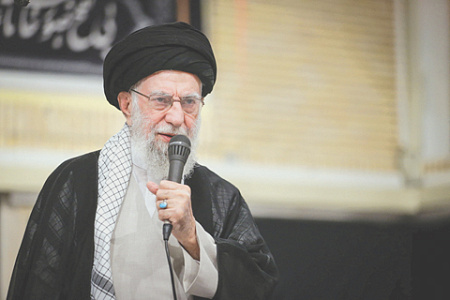
Tensions between Washington and Tehran have escalated sharply, with U.S. President Donald Trump accusing Iran of directly sabotaging ceasefire negotiations between Israel and Hamas. The accusation came just a day after Trump threatened renewed military strikes on Iran’s nuclear infrastructure, prompting a defiant response from Iranian Supreme Leader Ali Khamenei.
Speaking after a meeting with British Prime Minister Keir Starmer in Scotland, President Trump warned that if Iran were to restart its nuclear program, “we will take care of the destruction faster than you can snap your fingers.” He then directly implicated Tehran in the faltering peace process, stating, “I think they [the Iranians] interfered in those negotiations, they’ve told Hamas, they’ve given them signals and they’ve given them orders. And that’s not a good thing.”
In a speech in Tehran commemorating commanders and scientists killed in a recent 12-day war, Ayatollah Khamenei asserted that the United States is merely seeking pretexts to continue its confrontation with the Islamic Republic. “What they call the nuclear issue, the uranium enrichment issue, human rights, and so on, are just excuses,” Khamenei declared. He argued that the recent conflict had successfully demonstrated Iran’s strength and resolve to the international community.
Iran’s Foreign Ministry forcefully rejected Trump’s claims. Spokesman Esmail Baghaei labeled the accusation of interference as “absolutely baseless” and an “attempt to evade responsibility for U.S. complicity in the crimes of the Zionist regime” against Palestinians. He pointed to the high death toll in Gaza and the blockade of humanitarian aid as evidence of this alleged complicity.
The defiant rhetoric was echoed by Iran’s top military commander, General Abdolrahim Mousavi, who stated that Iran does not trust the U.S. or Israel and is “fully prepared to repel their attack in the future.” He claimed that the U.S. and Israel had suffered “serious losses” and failed to achieve their military objectives in the recent war, ultimately requesting a truce.
The diplomatic impasse deepened last week after Israel recalled its negotiators from Qatar, expressing dissatisfaction with Hamas’s response to the latest peace proposals. Reports suggest Israeli Prime Minister Benjamin Netanyahu is now considering the annexation of Gaza if the 21-month conflict doesn’t end and the remaining Israeli hostages are not released.
In the aftermath of the conflict, Iran appears to be heavily focused on internal security, with its Intelligence Ministry accusing the U.S. and Israel of plotting to install a puppet government. Some Western analysts believe this preoccupation with dismantling alleged internal spy networks may signal a period of reduced military readiness for Tehran.
However, the United States may also face constraints. Sources cited by American media reported that the Pentagon expended approximately a quarter of its advanced THAAD interceptor missile stockpile during the 12-day war. This significant depletion of the U.S. arsenal suggests that Washington’s readiness for a renewed conflict is heavily dependent on the production capacity of its defense industry.
